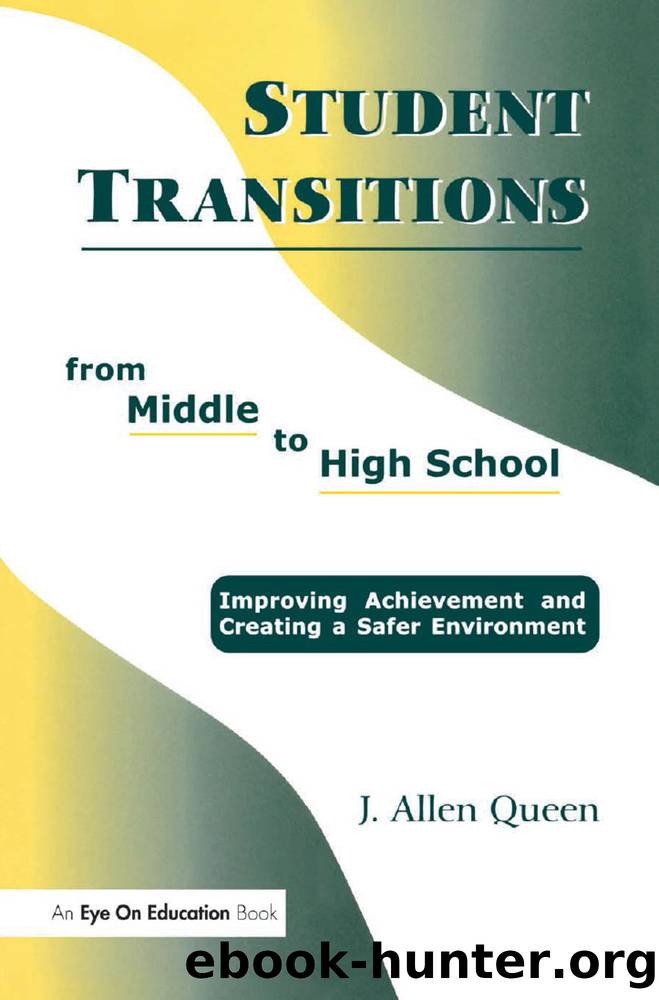Student Transitions from Middle to High School by Queen J. Allen;

Author:Queen, J. Allen; [Queen, J. Allen]
Language: eng
Format: epub
Publisher: Taylor & Francis Group
Published: 2013-08-15T00:00:00+00:00
Perhaps the best thing that we can do today is talk to our children as parents and our students as students, and of even greater importance, we must listen. We know that with the most deadly acts in our schoolsâ history, every shooter told someone what he was going to do (U.S. Secret Service 2001).
8
Responsibility and Civility
DOI: 10.4324/9781315852744-8
Throughout history, schools have been assigned the task of developing students into responsible, civil citizens, and citizenship has been the basis upon which curriculum has rested. Even in the times of the founders of our democracy it was stressed that education was to be focused on devotion to the public good. Then and now the welfare of our nation has rested upon an educated citizenry and the premise that public schools could best be used to teach the values and knowledge necessary for a functional society to exist (Berman 1997).
It is the basic purpose of a universal literacy to assimilate productive, contributing citizens who are prepared to handle local, national, and world issues. In a society that functions under democratic principles, it is important for individuals to make rational decisions and understand the consequences of their behavior, while being accountable for their choices and actions. (Queen 2002).
Academic subjects are important and essential, but they do not prepare young people to be functioning citizens. Unless academic subjects are presented in conjunction with some form of civil education, little is to be gained by students to prepare them for life in society. Therefore, the importance of addressing the teaching of responsibilmaintain positive self-conceptisty and civility in our schools is paramount, as it has been over time. If we are to produce students who will be well-adjusted, contributing members of society, teachers must guide them to be responsible and civil through the provision of experiences that make the concepts relevant and understood. Students will then be equipped with the knowledge necessary to understand their role in society.
Constant conflict in our schools can bring about the destruction of a school environment. Therefore, the teaching of responsibility and civility is very relevant to educators because the demonstration of these behaviors in students provides a positive, non-destructive school climate. An environment is determined by the way the people in the environment deal with conflict situations. Consequently, when students are taught to behave responsibly and to exhibit polite, civil behaviors to peers and adults, they are more likely to possess positive attitudes that transcend each aspect of the school setting. This will bring about the development of a nurturing, productive environment. Teachers are able to effectively provide instruction, allowing students to be engaged in active, productive activities. Focusing on the development of appropriate behaviors by stressing responsibility and civility enables students to be better equipped to demonstrate appropriate social interactions. Because they have been taught strategies that enable them to control their own behavior, discipline problems are alleviated before they transpire. Therefore, the school climate is a positive, quiet one that promotes learning and allows learning to occur.
Focusing on the
Download
This site does not store any files on its server. We only index and link to content provided by other sites. Please contact the content providers to delete copyright contents if any and email us, we'll remove relevant links or contents immediately.
The Art of Coaching Workbook by Elena Aguilar(51201)
Trainspotting by Irvine Welsh(21668)
The Secret History by Donna Tartt(19092)
Twilight of the Idols With the Antichrist and Ecce Homo by Friedrich Nietzsche(18635)
All the Missing Girls by Megan Miranda(16031)
Cat's cradle by Kurt Vonnegut(15359)
Ready Player One by Cline Ernest(14677)
Talking to Strangers by Malcolm Gladwell(13370)
Fangirl by Rainbow Rowell(9254)
The remains of the day by Kazuo Ishiguro(9000)
The Compound Effect by Darren Hardy(8969)
Thirteen Reasons Why by Jay Asher(8912)
Tools of Titans by Timothy Ferriss(8396)
Periodization Training for Sports by Tudor Bompa(8274)
Wonder by R. J. Palacio(8113)
The Lover by Duras Marguerite(7903)
A Court of Wings and Ruin by Sarah J. Maas(7848)
Change Your Questions, Change Your Life by Marilee Adams(7783)
The Complete Stick Figure Physics Tutorials by Allen Sarah(7373)
